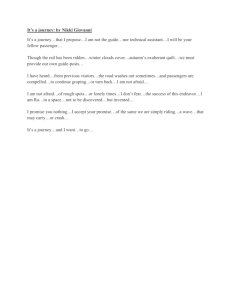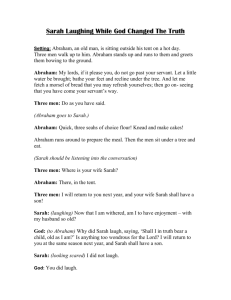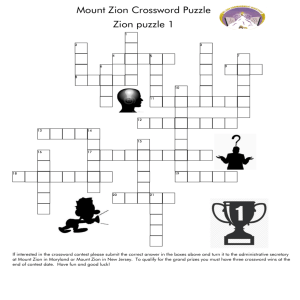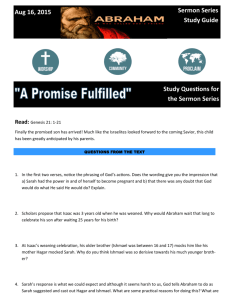“Abraham and Sarah” Genesis 11:31-12:9
advertisement
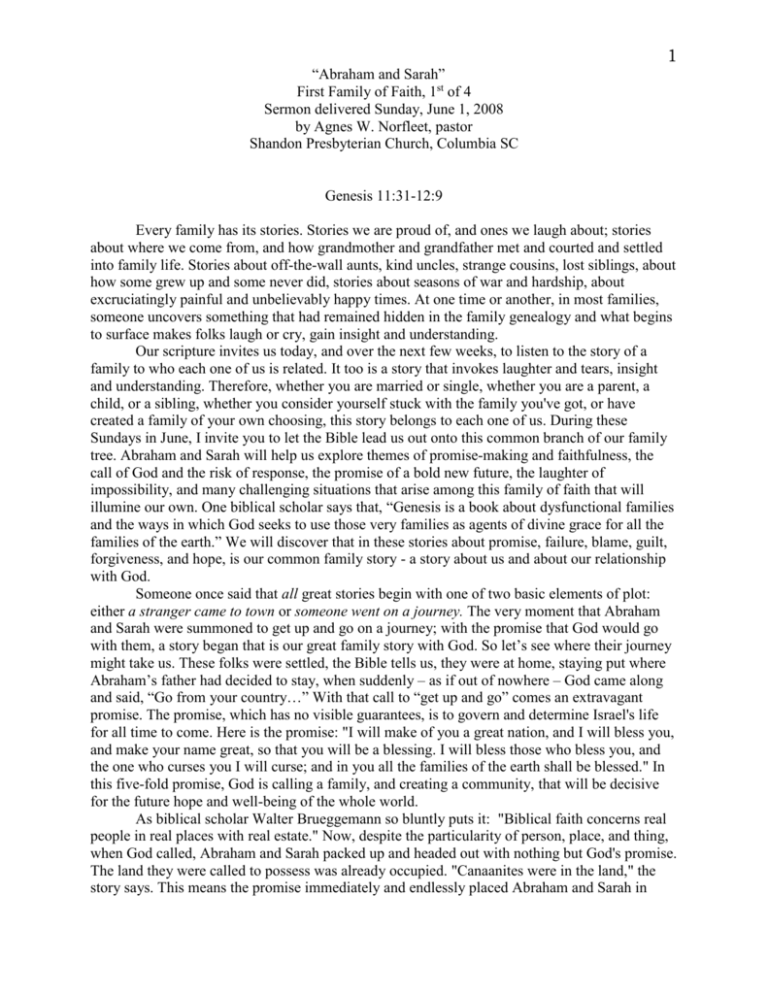
1 “Abraham and Sarah” First Family of Faith, 1st of 4 Sermon delivered Sunday, June 1, 2008 by Agnes W. Norfleet, pastor Shandon Presbyterian Church, Columbia SC Genesis 11:31-12:9 Every family has its stories. Stories we are proud of, and ones we laugh about; stories about where we come from, and how grandmother and grandfather met and courted and settled into family life. Stories about off-the-wall aunts, kind uncles, strange cousins, lost siblings, about how some grew up and some never did, stories about seasons of war and hardship, about excruciatingly painful and unbelievably happy times. At one time or another, in most families, someone uncovers something that had remained hidden in the family genealogy and what begins to surface makes folks laugh or cry, gain insight and understanding. Our scripture invites us today, and over the next few weeks, to listen to the story of a family to who each one of us is related. It too is a story that invokes laughter and tears, insight and understanding. Therefore, whether you are married or single, whether you are a parent, a child, or a sibling, whether you consider yourself stuck with the family you've got, or have created a family of your own choosing, this story belongs to each one of us. During these Sundays in June, I invite you to let the Bible lead us out onto this common branch of our family tree. Abraham and Sarah will help us explore themes of promise-making and faithfulness, the call of God and the risk of response, the promise of a bold new future, the laughter of impossibility, and many challenging situations that arise among this family of faith that will illumine our own. One biblical scholar says that, “Genesis is a book about dysfunctional families and the ways in which God seeks to use those very families as agents of divine grace for all the families of the earth.” We will discover that in these stories about promise, failure, blame, guilt, forgiveness, and hope, is our common family story - a story about us and about our relationship with God. Someone once said that all great stories begin with one of two basic elements of plot: either a stranger came to town or someone went on a journey. The very moment that Abraham and Sarah were summoned to get up and go on a journey; with the promise that God would go with them, a story began that is our great family story with God. So let’s see where their journey might take us. These folks were settled, the Bible tells us, they were at home, staying put where Abraham’s father had decided to stay, when suddenly – as if out of nowhere – God came along and said, “Go from your country…” With that call to “get up and go” comes an extravagant promise. The promise, which has no visible guarantees, is to govern and determine Israel's life for all time to come. Here is the promise: "I will make of you a great nation, and I will bless you, and make your name great, so that you will be a blessing. I will bless those who bless you, and the one who curses you I will curse; and in you all the families of the earth shall be blessed." In this five-fold promise, God is calling a family, and creating a community, that will be decisive for the future hope and well-being of the whole world. As biblical scholar Walter Brueggemann so bluntly puts it: "Biblical faith concerns real people in real places with real estate." Now, despite the particularity of person, place, and thing, when God called, Abraham and Sarah packed up and headed out with nothing but God's promise. The land they were called to possess was already occupied. "Canaanites were in the land," the story says. This means the promise immediately and endlessly placed Abraham and Sarah in 2 crisis. Faith, as they embraced it, is a decision to trust the promise precisely where the promise is in question and is at risk. (1) A pastor friend of mine wrote in his church newsletter about Making Commitments. He had in mind the commitment his church had made to undertake a major renovation. He had in mind the commitments three couples in his church had made as they were celebrating golden wedding anniversaries this spring. He had in mind the commitments he had made in marriage, at the baptism of his children, and at his ordination, when he wrote this: "You know the funny thing about all of these commitments is how they are not fully grasped except in retrospect. They are not visible to us on the front end. We make a promise, which is often deceptively easy to make, and then we live into the consequences of that promise. When it comes to our major commitments, it takes years to acquire anything resembling a good view," he said. “If you look back over time at the major commitments you have made – a decision about what school to attend, a career choice, which church to join, marriage, or to end a broken marriage, to have children or not; if you look back over time at the major commitments you have made – you realize that all that followed from two simple words: "I will," or “I do,” hurled you into the mystery which the future always is." This preacher friend ends his reflection saying: "There comes a point when our major commitments are huge leaps of faith that are flung into the future with no guarantees, except, perhaps, the one about losing your life in order to find your life." (2) Imagine, for a moment, what Abraham and Sarah were journeying into. They left behind a lot in order to find their life with God. It was not unlike the world we wake up to. It was a journey of faith in the One, True God through days littered with other, lesser gods. Theirs was an age of wandering, of migration of whole groups of people from one place to another, looking for a better economy in which to work and raise their families. It was a time of tribal warfare, and religious strife, of burned out hopes and dreams. "Go from your country and your kindred and your father's house to the land I will show you," God said. These words called them into a pilgrimage of uncertainty and yet, by the promises of God, into a more hopeful tomorrow. Sarah and Abraham remind us that there is no Genesis, no real beginning, apart from the reality of God; there is no hope for a brighter tomorrow without trust in the Promise-Maker; there is no movement toward realizing God’s intention for all creation without the bold response of human partners, joining in God’s blessing all the people of the earth. Recently a researcher on happiness was being interviewed on National Public Radio. He has studied in depth what makes for human happiness and flourishing. It amounts to three things, he concluded: meaningful work, meaningful relationships (having those to love and those who love you), and having a sense of hope in the future. (3) The promise given to Abraham and Sarah, to have a sense of hope in the future, was not for them alone. God did not say, “I’ll give you the big farm in Canaan, a good job with great benefits, good schools for your children, and a lovely retirement community where you can live out your days with people a lot like you.” No, God said, “I will bless you, and give you family, and meaningful work trusting in my promises, so that through you all the families of the earth will be blessed.” That is the hope to which this family we have come to call the church lives into. To understand that our welfare and our future is contingent; it is related to the welfare of God’s children everywhere. As the summer stretches out before us here at Shandon we have one opportunity after another to engage in the kind of journey upon which Abraham and Sarah embarked listening for the word of God, trusting God’s promises, and moving forward together into a more hopeful future. Our Middlers will be heading to Charlotte to work among the homeless poor to discover how our blessings are related to their welfare. Our Senior Highs will journey to New Orleans to rebuild houses, to engage in the promise keeping of God, that all the families of the earth will be 3 blessed. An intergenerational group will head to Honduras again – where so many of this congregation have gone before – to reunite with our brothers and sisters in Christ there. Our summer church school offerings, each in its own way, is about this incredible journey of faith upon which we have embarked: studying the word of God, the mission of Jesus Christ, telling our faith stories, living simply so that others may simply live. Together we are being invited to discern how God is calling us to faith in a future of hope and promise for all the earth. The poet Robert Frost once spoke of the founders of this county and how they journeyed forth without a map saying: They “…did not believe in the future, they believed it in. You are always believing ahead of evidence. Where is the evidence that I can write a poem? I just believe it in. The most creative thing in us is to believe a thing in.” Then Robert Frost says, “The ultimate example is the belief in the future of the world. We believe the future in. It’s coming because we believe it in.” (4) Sarah and Abraham are our models for believing the promises of God, and thereby believing the future in. Come, in the weeks ahead, let us get up and go with Abraham and Sarah together. For if, we pay close attention to their story, I think we will recognize ourselves as people who are journeying forward in faith as well. Because the truth is that it is in our genes, it is in the DNA that makes of us a family of faith, to respond to the call of God with spontaneous abandon, and to believe a more hopeful future in. AMEN. NOTES 1) Breuggemann, et al, Texts for Preaching, Year A, p. 356. 2) From Ted Wardlaw's "Central Topics" in the Weekly of Central Presbyterian Church, Atlanta, May 25, 1996. 3) From notes taken at Montreat Reclaiming the Text Conference lecture by Diana Butler Bass, 5/29/08. 4) Robert Frost quote from Patricia de Jong’s sermon, “Blessings and Promises”, First Congregational Church of Berkley, 6/9/96. NOTES Parker Palmer quote from Sib Towner’s closing lecture before retiring from Union-PSCE, May 2002.
